Goldendoodles have a reputation for being full of boundless energy. That’s why these popular family pets are such good dogs for life in an active, outdoorsy household where they can accompany their owners on hikes, hunting trips, and the like.
That’s great, but you might be wondering at what age do Goldendoodles calm down? And does that famous Goldendoodle energy level ever drop?
Keep reading to find out!
Table of Contents
When Do Goldendoodles Calm Down?
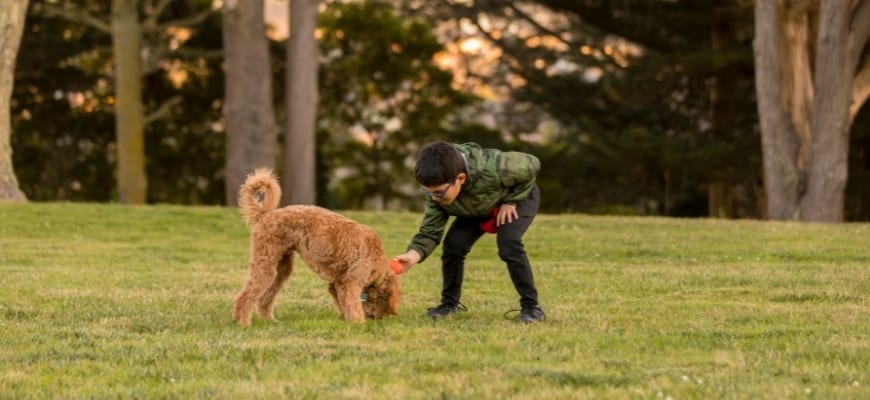
If you’re concerned that your Goldendoodle puppy is never going to calm down, don’t panic! Although your new canine companion will always be energetic and full of fun, he will gradually calm down as he matures and gets older.
As a general rule of thumb, you can expect your dog to begin settling down between 12 and 18 months of age. At that age, your furry fireball will be moving out of puppyhood and becoming more mature.
Some people report that the puppy starts to become less frantic once his baby teeth are lost at around six to eight months of age, but the craziness doesn’t usually abate until your pup begins transitioning to adulthood. Interestingly, that calming down phase often coincides with the puppy’s coat transition from fluffy teddy bear fur to coarser adult hair.
Three Stages Of Goldendoodle Energy Levels
There are three accepted stages of Goldendoodle energy levels:
- Puppy stage: Goldendoodle puppies are absolutely chock full of boundless energy and often show manic behavior!
- Adult stage: Your adult Doodle will still have a high level of energy, but that will gradually diminish.
- Senior stage: Just like people, senior Goldendoodles are generally less crazy than younger dogs and have a lower activity level.
That being said, every dog is different, and you can sometimes get a puppy that’s surprisingly quiet and laid-back vs. a senior Doodle that never seems to stop running and jumping for joy!
What Affects Goldendoodles’ Energy Levels?
Every dog is different, and some are more lively than others. However, your Goldendoodle’s age is probably the most influential factor that will affect his energy levels.
As a puppy, your Goldendoodle will be bouncing with energy! Your pup will want to play, run, jump in short bursts. Between those frantic bouts of energy and playtime sessions, your Doodle puppy will take a nap, eat, and have another nap. As your puppy gets older, the need for napping decreases, but their levels of energy increase! So, a Goldendoodle puppy is very much like a child in that respect.
Once your Goldendoodle gets to the adolescent stage of his life, he will have endless energy to burn. During those years, typically from the age of six months to 18 months of age, your dog will need plenty of physical exercise every day. That exercise could take the form of long walks, interactive play sessions, or training sessions, all of which will help to burn off your pet’s excess energy.
How To Survive Puppyhood With A Goldendoodle
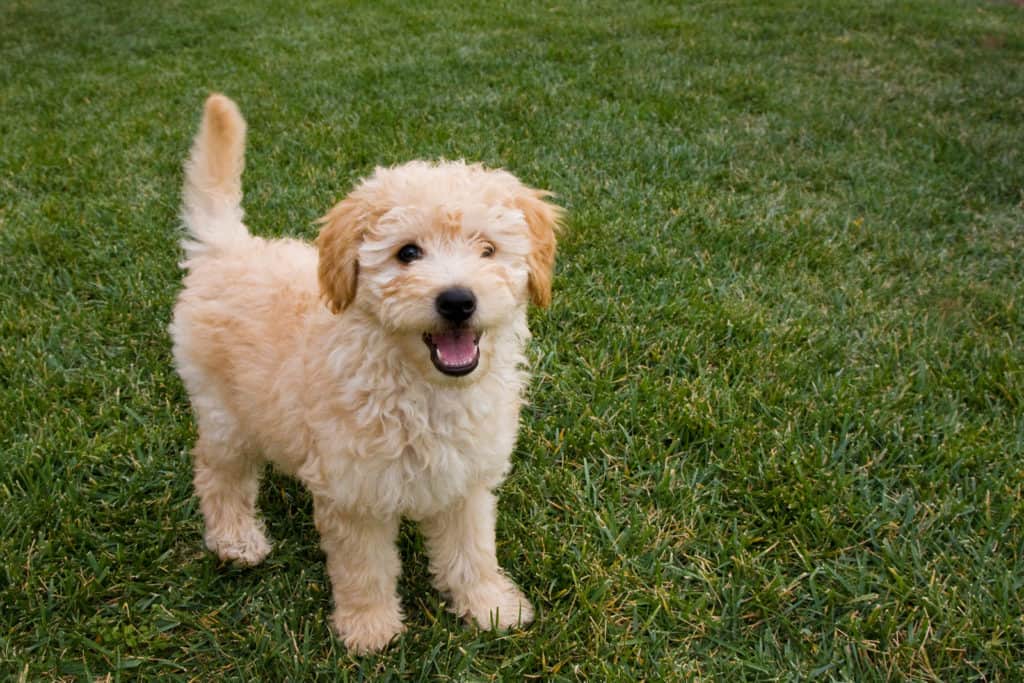
Many new owners ask themselves, “why is my Goldendoodle so hyper?”
Having massive amounts of energy is just a Goldendoodle thing! Both the Poodle and Golden retriever parent breeds are working dogs that are bred to have plenty of stamina so that they can work all day as bird dogs in the hunting field. So, it follows that the Goldendoodle will inherit all that energy.
When you take on a Goldendoodle puppy, you can expect a bit of naughtiness, the zoomies, and plenty of overexcited barking! The best way to control your puppy is to make sure that he is well-socialized and properly trained from a very young age. Many vet clinics run puppy training and socialization classes. Alternatively, you can take advantage of incentives offered by the American Kennel Club (AKC), such as the STAR Puppy Program.
How Can I Deal With My Hyper Goldendoodle Puppy?
Goldendoodles love life and are generally happy-go-lucky characters. That can lead to crazy, undesirable behavior that’s primarily caused by overexcitement. Don’t be concerned! Goldendoodle puppies are extremely excitable by nature.
So, apart from giving him lots of exercise, what’s the best way to deal with your hyper Goldendoodle puppy’s excess energy?
Don’t Punish Your Puppy!
Goldendoodles don’t respond well to punishment or negative behavior on your part.
If you shout at your puppy when he gets overexcited, you’ll risk making your puppy afraid of you, and that will destroy his happy outlook and playful temperament.
Never hit your puppy, even if he chews your favorite shoes or trashes something in your home! Using physical punishment to chastise your puppy is never acceptable.
Use Positive Reinforcement, Diversion, And Prevention
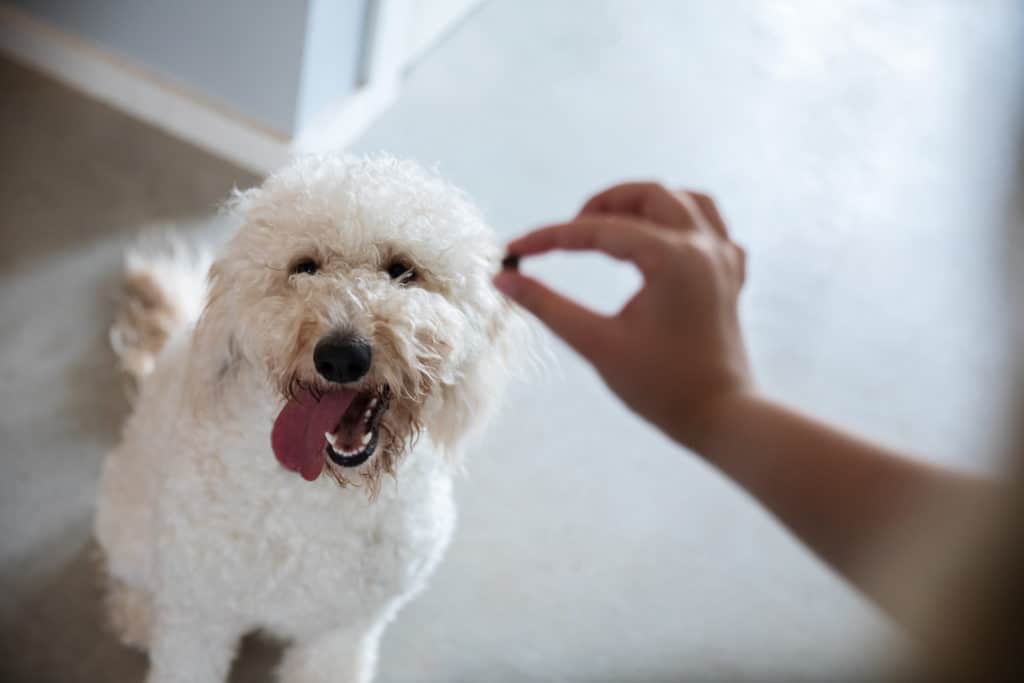
The best approach to take when training your puppy is to use positive reinforcement. Positive reinforcement involves rewarding your puppy’s behavior with praise, cuddles and treats whenever he does the right thing.
Don’t Reward Overexcitement
Now, although it’s true to say that the sight of an overexcited puppy going crazy and charging around with his ears flat and his tail rammed between his legs is hilarious, don’t reward that!
For example, if your puppy leaps up at you in his excitement at your return home from work, ignore him. Suppose you acknowledge the excitement by making a huge deal out of it. In that case, you’ll establish a trigger point that will effectively teach your puppy that the behavior is acceptable, and he’ll act out every time you get home.
Exercise Your Goldendoodle Daily
Older Goldendoodles need lots of regular exercise. Your dog will need at least 60 minutes of exercise in the form of a walk or a trip to the dog park every day, as well as a play session or some training.
In comparison, puppies tire easily, and a short walk and playtime with some toys will do the job. It’s important not to go overboard with physical activity for your puppy, as demanding too much of him could damage his growing joints.
Mental Stimulation
Goldendoodles are one of the most intelligent dog breeds you can find and they need plenty of mental stimulation to keep them happy and calm.
A bored Goldendoodle can easily become destructive and might begin to exhibit bad behaviors, especially if left alone for long periods. A frustrated Goldendoodle might begin chewing things, constantly barking, and even becoming depressed and withdrawn if he’s not provided with plenty of mental and physical stimulation.
Also, a bored Goldendoodle will become super-excited when anything interesting does finally happen.
As well as plenty of exercise, you need to keep your dog entertained by giving him a selection of interactive toys and spending time training your pet.
Useful Exercises To Help Calm Your Goldendoodle

As well as taking your Goldendoodle for a walk or to the dog park at least once every day, there are a few helpful activities that you can enjoy at home with your dog. All these fun games can help to strengthen the bond between you and keep your lively pup calm.
A lack of concentration and loss of focus are triggers for overexcitement in Goldendoodles of all ages. If you can distract or divert your dog’s attention by engaging him in a game, your pet is much less likely to become hyper.
Scent Training
Scent training or nose work is a very easy indoor activity that you can do with your Goldendoodle, which will tire him out both physically and mentally. This is a great indoor dog game for times when the weather is inclement, or you can’t take your dog out for a walk for some other reason.
Scent games are basically the equivalent of playing hide and seek but using food, ideally your Doodle’s favorite calming treat.
- Take a couple of empty cardboard boxes and put a treat inside one of them.
- Give your dog a treat and praise him.
- Now, allow your dog to sniff the boxes. Your Doodle should very quickly sniff out the treat! Reward your pet with lots of praise and extra treats.
- Make the game more difficult. Begin by hiding treats in different locations around your house, starting in just one room and gradually making the game more challenging by using multiple locations.
- Once the treats are safely hidden, you can send your dog on a snack hunt. Every time your Goldendoodle finds a tasty treat, he’s rewarded for his efforts.
The act of searching for the treats is both mentally and physically exhausting for your dog. So, a session of scent training every day or two is an excellent way of keeping your hyperactive pet calm.
Barking
Although Goldendoodles are not reputedly noisy dogs, it’s not unheard of for an overexcited Doodle to bark excessively. That generally happens when a dog is not sufficiently exercised or is stressed by a lack of company or mental stimulation.
Barking can be a nuisance for you and for your near neighbors, so it’s a behavior that should be discouraged. There’s good and bad barking.
Good Barking
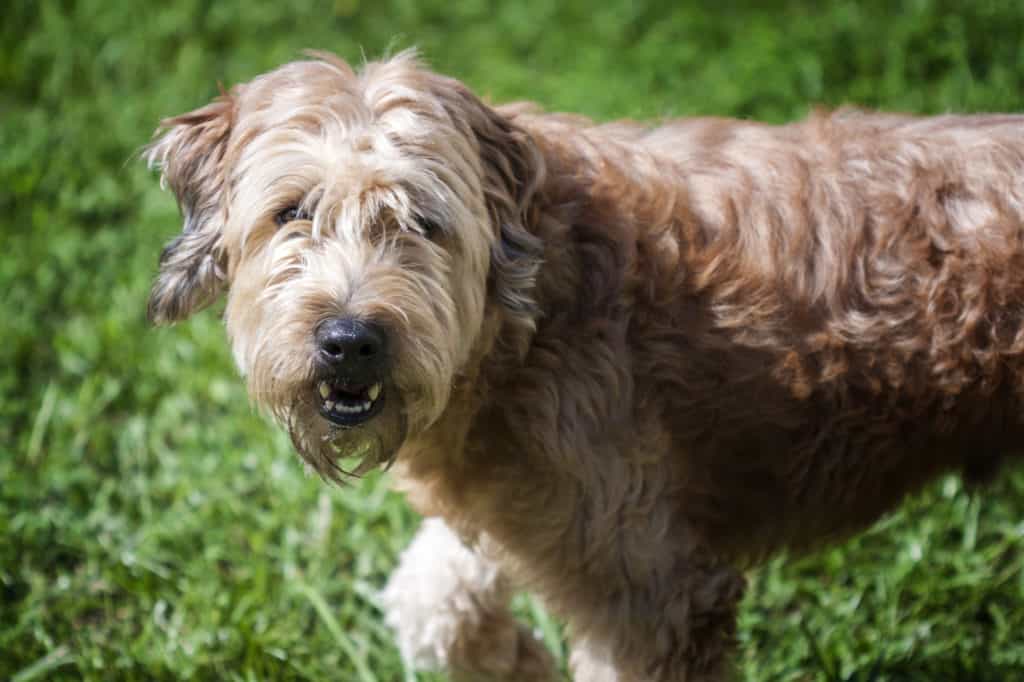
Good barking is when your pet barks to let you know that there’s someone at the door or there’s a stranger on your property. Sometimes, your dog might bark to let you know that he wants to go outside for a bathroom break, or you might have missed his dinner time!
Finally, many dogs simply bark because they’re happy and have a zest for life. Perhaps your Goldendoodle is barking to tell you that he’s pleased to see you when you come home from work, or you produce his leash so that he knows it’s time for a trip to the park.
Bad Barking
Bad barking usually happens when all is not well in your Goldendoodle’s life. For example:
- Separation anxiety: If your dog is left home alone, he might become distressed and begin barking, simply to see if you will come back to him.
- Fear: Sometimes, a loud noise or a stranger approaching their owner can trigger a Goldendoodle to begin barking.
- Attention seeking: Doodles are very sociable animals that love to be the center of attention. If your dog thinks he’s being left out of things, he might begin barking to draw attention to himself.
- Health Issues: If your dog is in pain, he might start barking or yapping in response to sharp pain, for example, if your pet has arthritic joints that hurt him when he gets up, he might bark.
Preventing Problem Barking
To fix the problem of barking, you need to work out what’s causing the behavior. For example, it could be that your dog hates being left alone. In that case, you’ll need to either place him in doggy daycare while you’re out at work, hire a dog walker or sitter to come in while you’re out, or see if your company will allow you to take your pet to work.
If your Goldendoodle barks whenever he sees someone passing by in the street outside or when he catches sight of a squirrel in your backyard, try closing the shades or drapes or rearranging your furniture to block your dog’s view.
Biting And Mouthing

All puppies use their mouths to explore new things and express themselves. That can be a real pain, literally! Puppy teeth are needle-sharp and can inflict a very painful bite, especially on a small child. So, you need to nip the habit in the bud (see what we did there!)
Also, biting and chewing can result in damage to your furnishings, clothing, and even to the very fabric of your home. That kind of destructive behavior is usually caused when your puppy is teething and can be addressed by providing your pup with hard rubber chews to play with rather than your $500 Jimmy Choos!
What Toys Are Best For Calming Goldendoodles?
As well as taking your Goldendoodle for a walk and doing some basic obedience training can help to calm your furry friend, you might also want to invest in a few dog toys to keep your pet entertained.
One of the most popular toys that work extremely effectively with hyperactive Goldendoodles is the traditional Kong rubber dog toy. The Kong doesn’t look like much, but this puzzle toy works in multiple ways to amuse your dog and solve behavioral problems.
Basically, the Kong is a hollow, rubber chew toy that you can fill with treats and then freeze. Once the contents are frozen, you can give the Kong to your puppy or adult Doodle. The dog will be kept amused for hours, first working out that there’s food inside the toy and then trying to get the frozen goodies out.
Other plus points of a Kong toy include:
- Chewing on a Kong toy can prevent teething puppies from chewing and damaging items around your home.
- When a puppy is teething, its gums are often sore and inflamed. A frozen Kong can be very soothing for your puppy, cooling his mouth.
- Freezing treats inside the toy can save you quite a lot of cash, as the treats last much longer than they would if you simply gave them to your pet right out of the packet.
Other fun toys for Goldendoodles can be made at home. For example, try upcycling some of your old T-shirts and turning them into tug-of-war toys.
Keep Calm And Carry On!
Dogs are very sensitive creatures, and if you’re stressed, your dog might pick up on that and become anxious too. That can trigger your puppy’s hyper behavior, further stressing you out and exacerbating the situation further.
Try keeping calm. Make yourself relaxed when you’re around your dog so that your pet doesn’t immediately pick up on your stressed vibe and react to it. Praise your dog for remaining calm and chilled out and reward him with a treat or two.
Sit!
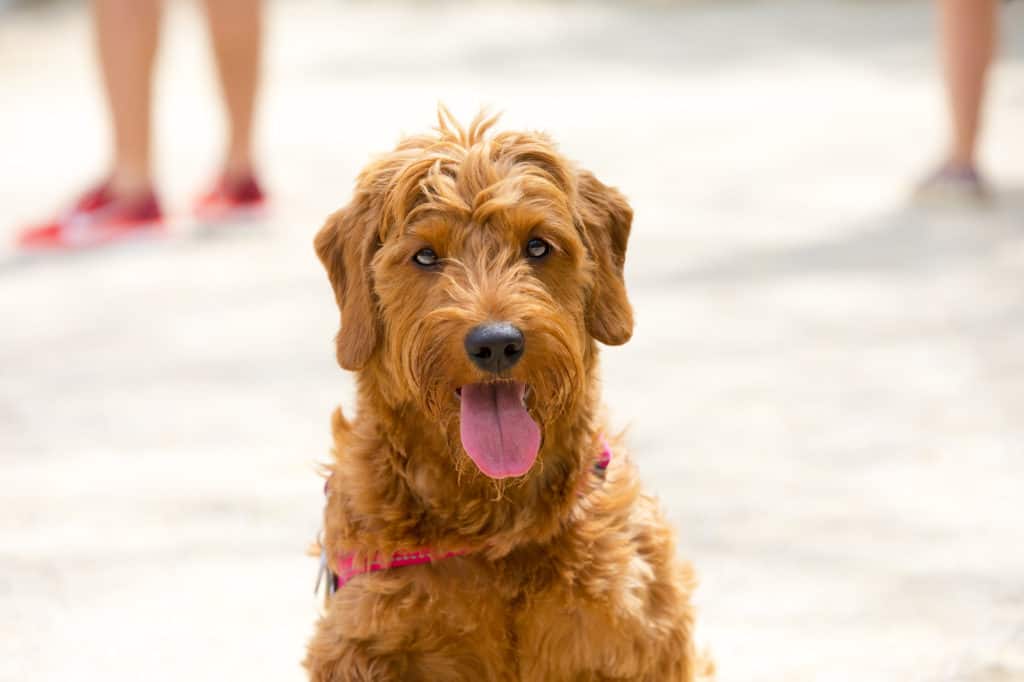
You can use a basic command, such as “sit,” to calm your Goldendoodle. By asking your dog to sit down quietly beside you, you’re encouraging him to relax rather than dashing around and becoming overexcited. That strategy also works well when you’re out and about with your dog. In a situation that could become difficult, simply ask your dog to sit down and take a breath.
Similarly, when visitors come to your home, make sure that your dog sits calmly to greet them rather than jumping up or charging around the room.
Remember to use positive reinforcement when teaching your dog anything. Reward your pet with praise and treats when he does what you ask.
When Will My Goldendoodle Calm Down Completely?
Goldendoodles are relatively long-lived when compared with other dog breeds. Generally, smaller varieties of Doodles live longer than larger ones, but the general expectation for a Goldendoodle’s lifespan is up to 15 years.
Although it will most likely never be the case that your Goldendoodle will be completely calm, senior dogs are generally less likely to charge around uncontrollably than their younger counterparts. As your dog ages, you’ll notice a subtle change in his behavior, and he will become calmer.
However, as a general rule, most Goldendoodle owners find that their dogs are quieter and less boisterous once they get to around two to three years old. That said, some owners report that their Doodles were simply completely crazy and never slowed down until their very senior years.
In Conclusion
Did you enjoy our guide to Goldendoodle energy levels? If you did, please remember to share.
Goldendoodles are reputedly crazy characters, especially when they’re puppies. That’s why we recommend Goldendoodles as pets for active, busy households where spending time outdoors is a given.
So, if you take home a Goldendoodle puppy, you must be prepared for the zoomies, barking, chewing, and general lunacy for at least the first year of your pet’s life. After that time, your dog’s energy levels should plateau so that the correct amount of exercise and mental stimulation will keep your pet calm and manageable.
Is your Doodle a crazy Dude? Tell us how you cope with your pet’s boundless energy in the comments box below.
I was so glad to read your article about golden doodles. My mini who is now 40 lbs. is exactly as you described in your article. I was so worried that I made a mistake when I purchased him because he has so much energy. His name is Rascal and he is truly a Rascal. We’ve been to puppy training and some things worked but I have not been successful with the walking/pulling. On my 3rd harness per recommendation from trainers. Hopefully, the gentle leader will work. But I really appreciate your article. I’ll be patient with my little guy now that I know his behavior is quite normal. Greatest companion ever. Love him so much. With all his craziness he has brought me so much joy.